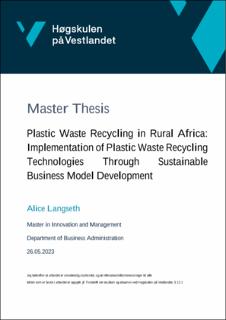Plastic Waste Recycling in Rural Africa: Implementation of Plastic Waste Recycling Technologies Through Sustainable Business Model Development
Master thesis
Permanent lenke
https://hdl.handle.net/11250/3101539Utgivelsesdato
2023Metadata
Vis full innførselSamlinger
Sammendrag
Plastic waste pollution is a global problem, but it is especially prominent in most of Africa’s rural towns. While there is research that investigates plastic waste management in Africa, there is a lack of research on how to implement sustainable solutions to increase the efficiency of plastic waste recycling. This thesis has been written to map different drivers and challenges to develop more effective and sustainable systems for plastic recycling in rural African Areas. This thesis aimed to answer the research question, “How can business model innovation and technology adaptation increase the viability of plastic recycling in the informal waste sector in rural Africa?”.
The research question was explored through a multiple-comparative case study. The three cases were a plastic recycling project in Uganda, Tanzania, and Mali. I personally participated in the project in Uganda, where data was collected through two field trips and qualitative interviews. Data for the two other cases were collected through qualitative interviews with project participants and document analysis. The data were analyzed through a framework for plastic waste management innovation that builds on a framework for responsible research. This framework comprises four dimensions, territoriality, discourse, materiality, and organization. The key findings from this study show that the waste management practices in rural Africa are poor, where PET and LDPE are common pollutants. Plastic waste is generally burned or openly dumped, causing negative impacts on both the environment and human health. There are structures in the informal waste sector for collecting, processing, and selling plastics, but they face challenges with a lack of equipment and capital to streamline their businesses. The projects have implemented different technological solutions and aim to develop profitable business models to increase the efficiency of plastic waste recycling.
The results from the analysis suggest that the adaptation of technological solutions to local conditions, production methods, and available resources can result in a long-term solution that increases the potential for successfully creating economic, environmental, and social value. The implementation of these recycling technologies should be paired with a sustainable business model to ensure production, viability, and profitability. Lastly, the framework for plastic waste management innovation is shown to be a beneficial tool in developing technological solutions and business models to ensure that they are suitable for local conditions.
Beskrivelse
Master i innovasjon og ledelse, samfunnsfaglig retning. Høgskulen på Vestlandet, campus Bergen

